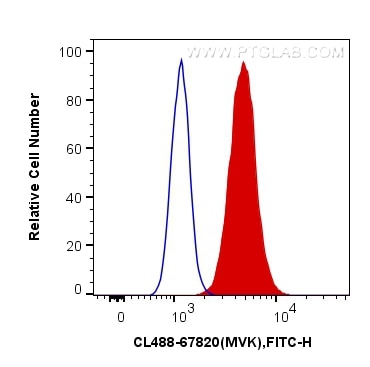Tested Applications
| Positive FC (Intra) detected in | HepG2 cells |
Recommended dilution
| Application | Dilution |
|---|---|
| Flow Cytometry (FC) (INTRA) | FC (INTRA) : 0.40 ug per 10^6 cells in a 100 µl suspension |
| It is recommended that this reagent should be titrated in each testing system to obtain optimal results. | |
| Sample-dependent, Check data in validation data gallery. | |
Product Information
CL488-67820 targets MVK in FC (Intra) applications and shows reactivity with human samples.
| Tested Reactivity | human |
| Host / Isotype | Mouse / IgG2b |
| Class | Monoclonal |
| Type | Antibody |
| Immunogen |
CatNo: Ag28887 Product name: Recombinant human MVK protein Source: e coli.-derived, PET28a Tag: 6*His Domain: 1-396 aa of BC016140 Sequence: MLSEVLLVSAPGKVILHGEHAVVHGKVALAVSLNLRTFLRLQPHSNGKVDLSLPNIGIKRAWDVARLQSLDTSFLEQGDVTTPTSEQVEKLKEVAGLPDDCAVTERLAVLAFLYLYLSICRKQRALPSLDIVVWSELPPGAGLGSSAAYSVCLAAALLTVCEEIPNPLKDGDCVNRWTKEDLELINKWAFQGERMIHGNPSGVDNAVSTWGGALRYHQGKISSLKRSPALQILLTNTKVPRNTRALVAGVRNRLLKFPEIVAPLLTSIDAISLECERVLGEMGEAPAPEQYLVLEELIDMNQHHLNALGVGHASLDQLCQVTRARGLHSKLTGAGGGGCGITLLKPGLEQPEVEATKQALTSCGFDCLETSIGAPGVSIHSATSLDSRVQQALDGL Predict reactive species |
| Full Name | mevalonate kinase |
| Calculated Molecular Weight | 396 aa, 42 kDa |
| Observed Molecular Weight | 42 kDa |
| GenBank Accession Number | BC016140 |
| Gene Symbol | MVK |
| Gene ID (NCBI) | 4598 |
| RRID | AB_2923795 |
| Conjugate | CoraLite® Plus 488 Fluorescent Dye |
| Excitation/Emission Maxima Wavelengths | 493 nm / 522 nm |
| Form | Liquid |
| Purification Method | Protein A purification |
| UNIPROT ID | Q03426 |
| Storage Buffer | PBS with 50% glycerol, 0.05% Proclin300, 0.5% BSA, pH 7.3. |
| Storage Conditions | Store at -20°C. Avoid exposure to light. Stable for one year after shipment. Aliquoting is unnecessary for -20oC storage. |
Background Information
MVK (Mevalonate kinase) is a 42 kDa cytoplasmic protein that belongs to the GHMP kinase family. Mevalonate kinase catalyzes the ATP-dependent phosphorylation of mevalonic acid to form mevalonate 5-phosphate. Defects in mevalonate kinase can cause mevalonic aciduria (MEVA). It is an accumulation of mevalonic acid which causes a variety of symptoms such as psychomotor retardation, dysmorphic features, cataracts, hepatosplenomegaly, lymphadenopathy, anemia, hypotonia, myopathy and ataxia.
Protocols
| Product Specific Protocols | |
|---|---|
| FC protocol for CL Plus 488 MVK antibody CL488-67820 | Download protocol |
| Standard Protocols | |
|---|---|
| Click here to view our Standard Protocols |




